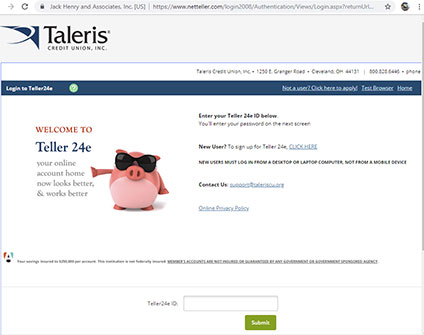It’s the Holidays… and that means more people are shopping than any other time of year. It also means that more criminals are trying to steal our personal information in order to commit fraud. Sad… but true. So, what can you do? Here’s 8 things you can do right now to protect yourself:
1. Monitor your accounts – Throughout the holiday season, keep a close eye on your Taleris accounts and credit card accounts. Look out for anything that doesn’t look normal including charges you don’t recognize. Also, set up alerts on your accounts to warn you when something is wrong or a threshold you set is surpassed. You can easily do this from inside Teller 24e to further protect your Taleris savings and checking accounts. Call us at 216.739.2300 or email us at support@taleriscu.org if you need help setting those up.
2. Don’t click links in emails – Emails are a particularly common way for criminals to gain access to your credit card information or identity. Hackers send what’s called a phishing email, in which they copy a store’s sale or discount email and include a link to a false portal asking for your info.
3. Don’t open attachments from retailers – In the same way that you should avoid clicking on email links, you don’t open up attachments from retailers. Retailers won’t hide deals in attachments – that’s where attackers hide malware.
4. Avoid pop-ups and ads – Malware and viruses aren’t just spread via email. They can follow you around the Internet in the form of pop-ups and advertisements.
5. Beware of e-skimmers – Card skimming has been happening for years. It’s a scam that typically happens at gas stations or ATMs, where a criminal installs a device that gathers credit card numbers and information when you swipe your card. That practice has gone digital as well. Cyber thieves can now install malicious code on a retailer’s website to gather credit card data when you check out. To protect yourself from this practice, you can pay using a third party such as PayPal, Venmo or Amazon Pay, if the retailer allows it, so the store never actually has your credit card number.
6. Use a credit card, not your debit card – Many experts recommend that you use credit cards instead of debit cards. That’s because the Fair Credit Billing Act makes it so consumers are only liable for up to $50 in fraudulent charges. And major credit card companies, including American Express, Discover, MasterCard and Visa offer “zero liability” policies, so you don’t have to pay for any fraud.
7. Use a Secure Network – When shopping online, make sure you’re using a private Wi-Fi connection or your smartphone’s cellular network to browse the internet. Public Wi-Fi networks are notoriously insecure and could open you up to malware or hacking.
8. Diversify your passwords – Almost half of Americans, 47%, use the same passwords over and over again. But cyber thieves can use a stolen password and try to break into other accounts and sites that may expose your personal data. Phishing attempts can often be disguised as signups for retail rewards programs. If you take up on the offer, use a password that you haven’t used before.









Recent Comments